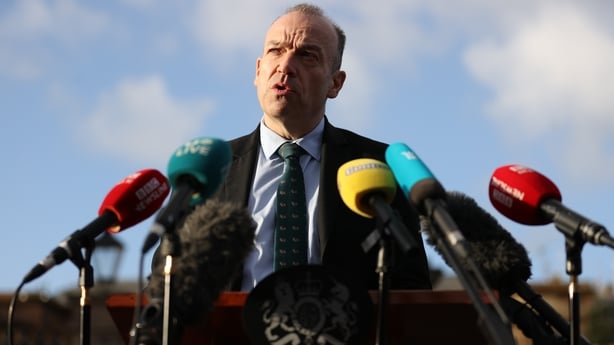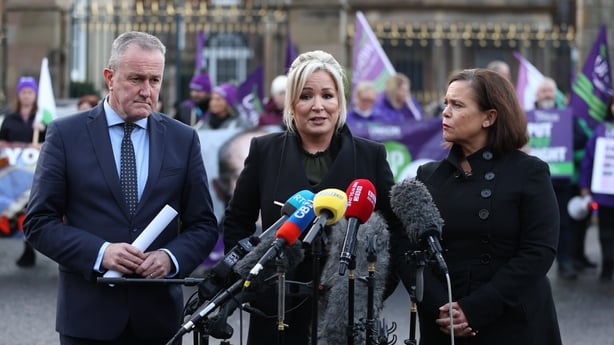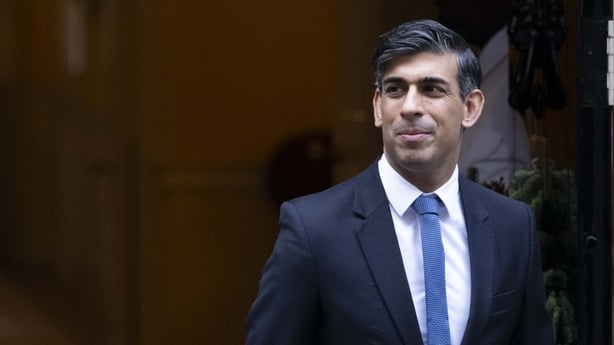Rishi Sunak had pencilled in a flying visit to the British royal palace in Hillsborough in Co Down to celebrate what he would have regarded as a crowning achievement.
A deal to restore power-sharing after a DUP boycott of almost two years would be given the prime ministerial stamp of approval.
The BBC's UK network Political Editor Chris Mason had his flight booked and was due to land in Belfast on Monday morning, expecting to travel to the Co Down village to report on a political breakthrough.
Northern Secretary Chris Heaton-Harris was ready to take the plaudits.
The Irish Government would have been ready to respond to an announcement that a deal had been done.
The hoped-for chain of events was that DUP leader Jeffrey Donaldson would signal to the Northern Secretary over the weekend that he was satisfied with progress in negotiations with senior UK officials about his party's concerns regarding the Windsor Framework and was ready to go back into Stormont.
A letter would then have been sent to the speaker of the Northern Ireland Assembly, Sinn Féin's Alex Maskey, asking him to convene a meeting for yesterday morning.
As Stormont's MLAs returned and prepared to elect a new executive, at the same time legislation would be tabled and passed in the House of Commons that would address DUP concerns about the Windsor Framework.

The legislation would have reinforced and future-proofed Northern Ireland's position within the UK internal market and provided assurances about its constitutional position.
It would have enabled the DUP to claim that its campaign to remove the so-called 'Irish sea border' had succeeded and that Belfast was once again as British as Bristol.
Alongside the new legislation, the British government would release billions of pounds of additional funding for the new ministers being elected at Stormont to tackle the huge problems their departments face.
Michelle O'Neill would have given her first press conference as first minister alongside a DUP deputy first minister, possibly Lagan Valley MLA Emma Lyttle Pengelly.
The new Stormont ministers would have smiled for the cameras and spoke of their determination and readiness to tackle the many crises they face.
The plan was in place. Everyone was ready. Apart from the DUP.
Hopes were being dashed shortly after they had been raised.
Last week, Tánaiste Micheál Martin told his parliamentary team that he believed a deal to restore devolution could be agreed within days.
That followed a telephone call with Jeffrey Donaldson where the DUP leader clearly indicated a willingness to move.
Mr Donaldson also spoke to Sinn Féin president Mary Lou McDonald and the party's leader in Northern Ireland and Stormont's first minister-in-waiting Michelle O'Neill and left them with the firm impression that he was preparing to move.

The other main parties at Stormont also believed a deal was on the horizon.
Last Thursday Mr Donaldson told BBC Northern Ireland that a decision about a return to Stormont was approaching.
When it was revealed a short time later that the 12-strong DUP officer team would meet on Friday, speculation about an imminent deal reached fever pitch.
But a well-placed DUP source who had been telling me for weeks that he doubted a deal could be agreed before Christmas cautioned against "getting too excited".
"Nothing is moving," he said.
"The timescale I've discussed with you will be proved right and all this media speculation will be proved wrong."
The party officer meeting took place, but there was no statement afterwards.
There was no call from Jeffrey Donaldson to Chris Heaton-Harris to signal that a deal was on.
The tentative plans for Rishi Sunak to fly in for a much-needed lap of honour were quietly binned.
Then on Monday morning just as talks about the British government's financial package to support a newly restored Stormont executive were about to resume at Hillsborough Castle, the DUP publicly scuppered the plan.
A senior spokesperson confirmed what several sources had been suggesting behind the scenes for some weeks: there would be no agreement to restore power-sharing before Christmas.
Not that it was unlikely or would be difficult. No deal. Simple.
The BBC's Chris Mason quickly cancelled his flight.
The northern secretary, who missed a self-declared deadline for the restoration of devolution before last Christmas, was facing another disappointment.
It must have been hugely embarrassing for Mr Heaton-Harris as he had brought Mr Sunak firmly into the mix.
Last Wednesday during Prime Minister's Questions, the DUP leader asked Mr Sunak if the British government would legislate to protect Northern Ireland's place within the UK internal market, a key party demand in the Windsor Framework negotiations.

Reading a prepared answer, the UK Prime Minister said his government stood ready to do so and believed things could move "at pace" alongside a deal to restore power-sharing.
The clearly choreographed intervention suggested it was game on.
Instead Mr Sunak and his Secretary of State for Northern Ireland were both left with egg on faces. Not for the first time.
On 17 February this year Mr Sunak flew into Northern Ireland to meet the leaders of the five main parties in the Culloden Hotel on the outskirts of Belfast.
He arrived hoping the DUP would commit to a deal to return to power-sharing, but left through a back door without a press conference after the party refused to budge and made it clear that more was needed to address its concerns about the post-Brexit trade agreement.
Once bitten, twice shy. This time around Mr Sunak made it clear he would not fly in until he knew a deal was in the can.
Expressing disappointment at the lack of a pre-Christmas restoration of devolution yesterday, Mr Heaton-Harris said financial discussions and all substantive negotiations about the Windsor Framework had been concluded.
That rattled Jeffrey Donaldson. He has been telling his party and unionist voters that negotiations were still ongoing and that progress was being made.
The DUP leader is said to have been visibly angry after being told that the northern secretary intended to declare the framework talks closed just a few minutes before the start of roundtable talks at Hillsborough yesterday.
There was a clear sense of panic in DUP ranks, with its Chief Executive Timothy Johnston arriving at the talks venue a short time after the notice had been given.
Mr Heaton-Harris read a prepared statement that he told those gathered around the table had been approved by Downing Street.
Many detected the hand of former secretary of state Julian Smyth, one of the architects of the agreement that restored Stormont after a three-year collapse in January 2020, who has been involved in the Windsor Framework discussions.
The current northern secretary stuck to the same script when addressing the media outside afterwards, even directly reading from it when answering some questions to ensure there was no deviation.
Jeffrey Donaldson looked ruffled as he repeatedly batted away media questions about the declaration of an end to the negotiations.
The DUP will seek comfort from some of the words used, like the fact that negotiations on "issues of substance" were said to have "effectively" ended and that he remains available to clarify issues.
"It depends how you define substantive issues and effectively," said one DUP source.
"We have issues, we need further clarification and discussion on that we regard as substantive and as far as we are concerned the door has been left open."
Mr Heaton-Harris also stressed that the £3.3 billion financial package from the British government to support a restored Stormont Executive will remain on the table, with no deadline for the DUP to end its boycott.
That has also given the DUP grounds for optimism that further negotiations will be possible.
But after the roundtable discussions the leaders of Sinn Féin, the Alliance Party and Ulster Unionist Party all insisted it had been made clear that the negotiations have ended.
So what now?
The next date being looked at as a possible deadline for progress is 18 January, when the northern secretary is legally obliged to name the date for a fresh Stormont Assembly election if devolution has not been restored by then.
Politicians and journalists in Northern Ireland know from past experience that deadlines can be missed and moved, and talks processes can be resuscitated and repackaged.
Naming the date for an election could potentially set back any prospects of a restoration of power-sharing as the DUP and Sinn Féin would both go into the electoral trenches and dig in.
Another option might be a long-promised review of the rules for the running of the Stormont Assembly which would remove the power of any one party to bring the institutions down.
If the Windsor Framework negotiations are really over, the DUP has stated there has not been enough progress to address its concerns, so as it stands it will not be going back into Stormont.
That could leave the much talked about Plan B - a reversion to direct rule from Westminster but with the Irish Government having a consultative role, a place at the table, as set out in the Good Friday Agreement.
That is a nightmare scenario for the DUP and its supporters and the British Government may hope that prospect could help persuade the DUP that it is in the best interests of the party and the Union of the United Kingdom it champions to go back into devolution.
But the DUP may be playing a longer game. Some of its elected members, political opponents and commentators suspect it may calculate that Rishi Sunak is effectively a busted flush and is so politically fragile that a general election could be called in Britain at any time.
If that is the case, some think it would be better to hold out for a fresh round of Windsor Framework talks with a new government, with several senior DUP members saying they believe Labour leader Keir Starmer might give them a better deal.
"Happy Christmas," Jeffrey Donaldson said to reporters as he left Hillsborough Castle early yesterday afternoon.
"See you back here next year" was one of the replies. It wasn't a joke.






